人教版七下英语Unit4单元知识点总结
- 格式:pdf
- 大小:24.66 KB
- 文档页数:2
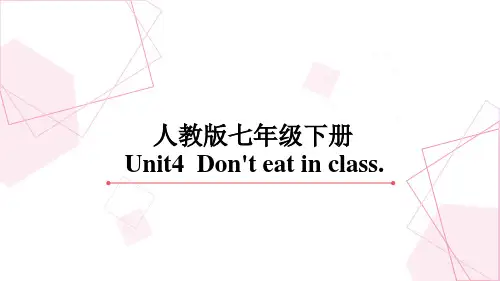
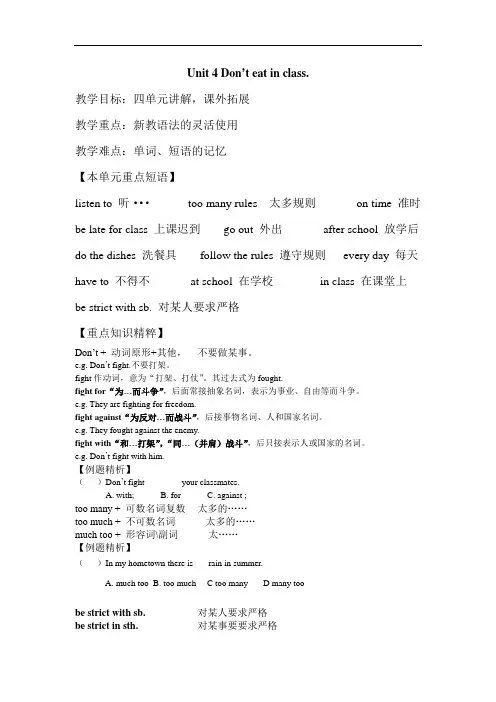
Unit 4 Don’t eat in class.教学目标:四单元讲解,课外拓展教学重点:新教语法的灵活使用教学难点:单词、短语的记忆【本单元重点短语】listen to 听···too many rules 太多规则on time 准时be late for class 上课迟到go out 外出after school 放学后do the dishes 洗餐具follow the rules 遵守规则every day 每天have to 不得不at school 在学校in class 在课堂上be strict with sb. 对某人要求严格【重点知识精粹】Don’t + 动词原形+其他,不要做某事。
e.g. Don’t fight.不要打架。
fight作动词,意为“打架、打仗”。
其过去式为fought.fight for“为…而斗争”,后面常接抽象名词,表示为事业、自由等而斗争。
e.g. They are fighting for freedom.fight against“为反对…而战斗”,后接事物名词、人和国家名词。
e.g. They fought against the enemy.fight with“和…打架”,“同…(并肩)战斗”,后只接表示人或国家的名词。
e.g. Don’t fight with him.【例题精析】()Don’t fight ________your classmates.A. with;B. forC. against ;too many + 可数名词复数太多的……too much + 不可数名词太多的……much too + 形容词\副词太……【例题精析】()In my hometown there is __ rain in summer.A. much tooB. too much C too many D many toobe strict with sb.对某人要求严格be strict in sth. 对某事要要求严格e.g. Mr. Smith is very strict with his children.We should be strict in (doing) our work.on time“准时,按时”,指按规定的时刻不早不晚。
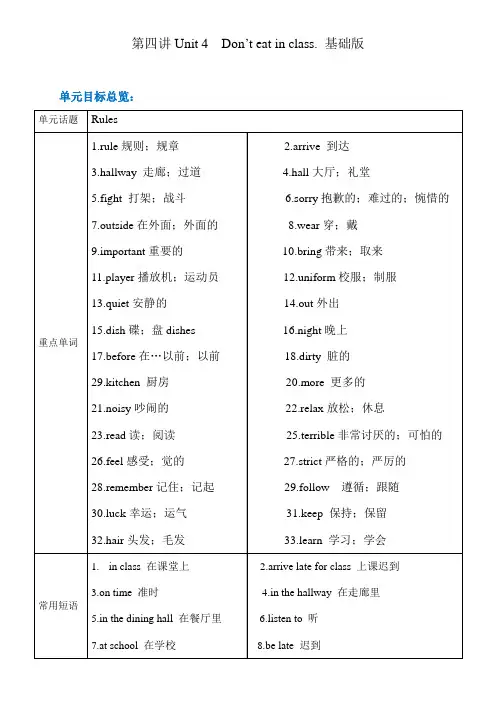
第四讲Unit 4 Don’t eat in class. 基础版单元目标总览:【知识点详解】1、Don’t arrive late for class.上课不要迟到。
1)arrive 意为“到达”。
arrive at+小地点,arrive in +大地点。
◆I will arrive in Beijing next week. 我下周到北京。
◆I arrived at the small village on a cold morning. 在一个寒冷的早晨我到达了那个小村庄。
2)arrive 后面跟地点副词here, there, home时,不需要跟介词。
◆arrive home 到家arrive here 到这儿2、You must be on time.你必须准时。
(1)on time&in timeon time 意为“按时,准时”,指按照规定的时间或者指定的时间做某事;而in time指“及时”,指不迟到或在规定的时间之前或者接近所规定的时间做某事。
◆We must arrive there on time. 我们必须按时到达那里。
At last, the police arrived there in time. 最后警察及时赶到了那里。
(2)must情态动词,意为“必须”,不能单独做谓语,必须和动词原形以其构成谓语;其后接动词原形;其否定形式mustn’t意为“禁止,千万不要”◆I must do my homework before dinner.晚饭前我必须做完作业。
3、Don’t listen to music in class.不要再课堂上听音乐。
(1)listen 是不及物动词,意为“听,倾听”,强调听的动作,后面接宾语时要加上介词to。
◆We should listen to the teacher carefully. 我们应该认真听老师讲课。
◆Listen! Someone is singing in the garden. 听! 有人在花园里唱歌。
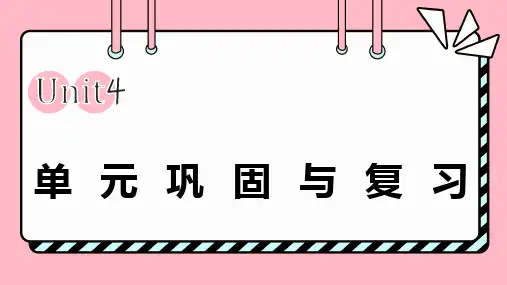
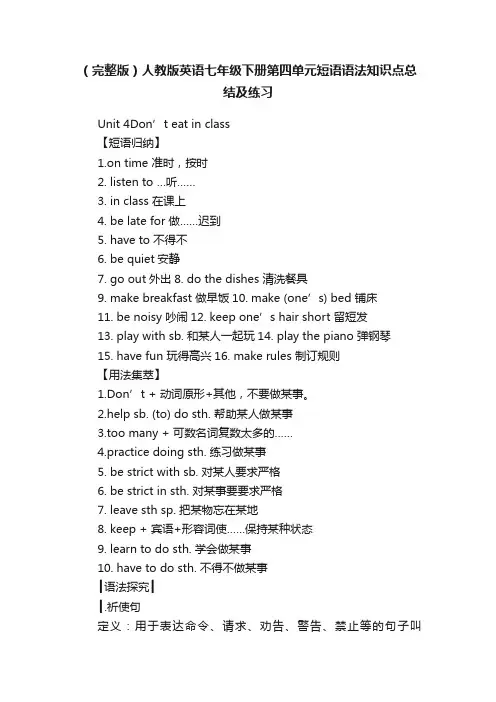
(完整版)人教版英语七年级下册第四单元短语语法知识点总结及练习Unit 4Don’t eat in class【短语归纳】1.on time 准时,按时2. listen to …听……3. in class 在课上4. be late for 做……迟到5. have to 不得不6. be quiet安静7. go out外出8. do the dishes 清洗餐具9. make breakfast 做早饭10. make (one’s) bed 铺床11. be noisy 吵闹12. keep one’s hair short 留短发13. play with sb. 和某人一起玩14. play the piano 弹钢琴15. have fun 玩得高兴16. make rules 制订规则【用法集萃】1.Don’t + 动词原形+其他,不要做某事。
2.help sb. (to) do sth. 帮助某人做某事3.too many + 可数名词复数太多的……4.practice doing sth. 练习做某事5. be strict with sb. 对某人要求严格6. be strict in sth. 对某事要要求严格7. leave sth sp. 把某物忘在某地8. keep + 宾语+形容词使……保持某种状态9. learn to do sth. 学会做某事10. have to do sth. 不得不做某事┃语法探究┃┃.祈使句定义:用于表达命令、请求、劝告、警告、禁止等的句子叫__________句。
时态:使用______________时态。
结构:动词原形+其他成分+please. 否定祈使句在动词原形前面加__________ 。
如:Be quiet in the classroom, please.在教室里请保持安静。
Don't fight. 不要打架┃.情态动词have to 和must1.情态动词have to和must都表示“__________”的意思。
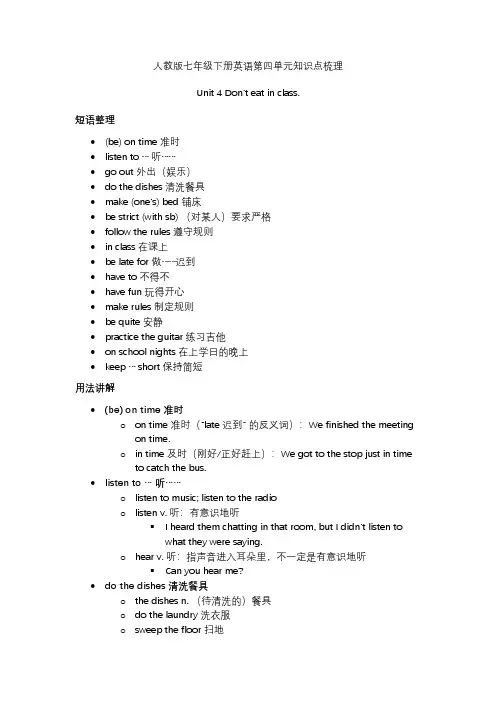
人教版七年级下册英语第四单元知识点梳理Unit 4 Don’t eat in class.短语整理•(be) on time 准时•listen to … 听……•go out 外出(娱乐)•do the dishes 清洗餐具•make (one’s) bed 铺床•be strict (with sb) (对某人)要求严格•follow the rules 遵守规则•in class 在课上•be late for 做……迟到•have to 不得不•have fun 玩得开心•make rules 制定规则•be quite 安静•practice the guitar 练习吉他•on school nights 在上学日的晚上•keep … short 保持简短用法讲解•(be) on time 准时o on time 准时(“late 迟到” 的反义词):We finished the meeting on time.o in time 及时(刚好/正好赶上):We got to the stop just in time to catch the bus.•listen to … 听……o listen to music; listen to the radioo listen v. 听:有意识地听▪I heard them chatting in that room, but I didn’t listen towhat they were saying.o hear v. 听:指声音进入耳朵里,不一定是有意识地听▪Can you hear me?•do the dishes 清洗餐具o the dishes n. (待清洗的)餐具o do the laundry 洗衣服o sweep the floor 扫地o mop the floor 拖地o do the cooking 做饭•make (one’s) bed 铺床o Remember to make your bed!•be strict (with sb) (对某人)要求严格o The teacher is strict with us.•follow the rules 遵守规则o= obey the ruleso= observe the ruleso We must follow the rules in the school.•in class 在课上o You shouldn’t eat in class. 上课时不能吃东西。

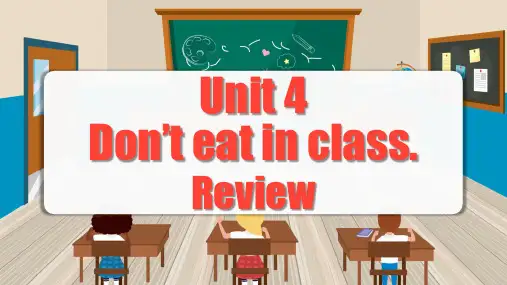
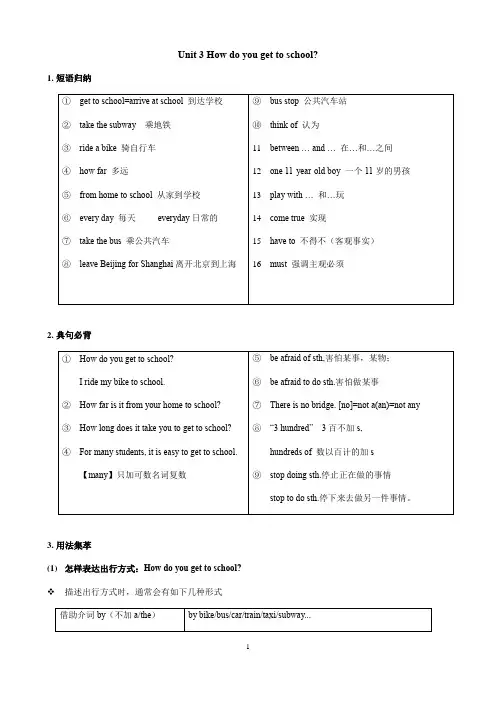
Unit 3 How do you get to school?1.短语归纳2.典句必背3.用法集萃(1)怎样表达出行方式:How do you get to school?❖描述出行方式时,通常会有如下几种形式注意:当交通工具的名词(如:bike, bus, train, car等)和by搭配时,它们前面不必加冠词;但当它们和on或in搭配时,它们之间要加冠词。
(2)基数词的表达法:基数词,表示数目或者数量的多少①one 到twelve,拼写和读音没有什么相似之处,无规律可言,应逐一进行记忆。
②thirteen到nineteen,表示“十几”,在个位数后加后缀-teen,读作/ti:n/。
注意thirteen, fifteen和eighteen的拼写。
③twenty到ninety,表示“几十”,以-ty结尾,但需注意下面几个词的拼写:twenty, thirty, forty, fifty, eighty。
④21~29直到91~99,表示“几十几”,用整十位加个位数表示,中间用连字符“-”把十位数与个位数连接起来。
例:21→twenty-one;35→thirty-five⑤one hundred意为“一百”,表示一百还可以用 a hundred。
要表示200~900,用“具体数字+hundred”。
⑥例:200 →two hundred;900→ nine hundred注意:❖hundred前面若有具体的数词,则要用hundred的单数形式,而且其后不能跟of,此时表达确切的数字概念。
例:There are two hundred people in the square. 广场上有两百人❖hundreds of表示“数以百计的”,此时表达模糊的数字概念。
如:There are hundreds of people in the square. 广场上有好几百人(3)How far is it from your home to school?❖from ... to ... 意为“从...到...”,表示“由一点到另一点”,可用于时间、地点、数目等。
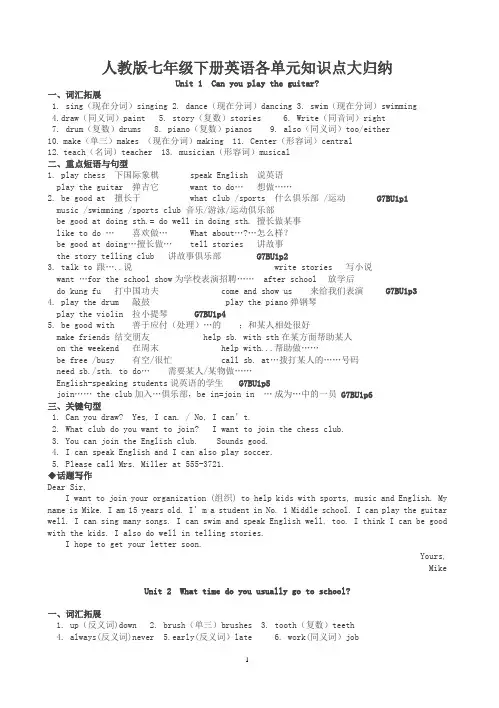
人教版七年级下册英语各单元知识点大归纳Unit 1 Can you play the guitar?一、词汇拓展1. sing(现在分词)singing2. dance(现在分词)dancing3. swim(现在分词)swimming4.draw(同义词)paint5. story(复数)stories6. Write(同音词)right7. drum(复数)drums 8. piano(复数)pianos 9. also(同义词)too/either10.make(单三)makes (现在分词)making 11. Center(形容词)central12.teach(名词)teacher 13. musician(形容词)musical二、重点短语与句型1. play chess 下国际象棋 speak English 说英语play the guitar 弹吉它want to do…想做……2. be good at 擅长于 what club /sports 什么俱乐部 /运动G7BU1p1music /swimming /sports club 音乐/游泳/运动俱乐部be good at doing sth.= do well in doing sth. 擅长做某事like to do …喜欢做… What about…?…怎么样?be good at doing…擅长做… tell stories讲故事the story telling club 讲故事俱乐部G7BU1p23. talk to 跟…..说 write stories 写小说want …for the school show为学校表演招聘…… after school放学后do kung fu 打中国功夫 come and show us 来给我们表演G7BU1p34. play the drum 敲鼓 play the piano弹钢琴play the violin 拉小提琴 G7BU1p45. be good with 善于应付(处理)…的;和某人相处很好make friends 结交朋友 help sb. with sth在某方面帮助某人on the weekend 在周末 help with...帮助做……be free /busy 有空/很忙call sb. at…拨打某人的……号码need sb./sth. to do…需要某人/某物做……English-speaking students说英语的学生G7BU1p5join…… the club加入…俱乐部,be in=join in …成为…中的一员G7BU1p6三、关键句型1. Can you draw? Yes, I can. / No, I can’t.2. What club do you want to join? I want to join the chess club.3. You can join the English club. Sounds good.4. I can speak English and I can also play soccer.5. Please call Mrs. Miller at 555-3721.◆话题写作Dear Sir,I want to join your organization (组织) to help kids with sports, music and English. My name is Mike. I am 15 years old. I’m a student in No. 1 Middle school. I can play the guitar well. I can sing many songs. I can swim and speak English well, too. I think I can be good with the kids. I also do well in telling stories.I hope to get your letter soon.Yours,Mike Unit 2 What time do you usually go to school?一、词汇拓展1. up(反义词)down2. brush(单三)brushes3. tooth(复数)teeth4. always(反义词)never5.early(反义词)late6. work(同义词)job7. night(反义词)day 8. half(复数)halves 9. run(现在分词)running10. clean(现在分词)cleaning 11. either…or… (反义词)neither …nor…12. life(复数)lives 13. taste(单三)tastes二、重点短语与句型1.get up 起床,站起 get dressed穿上衣服 have/take a shower 洗淋浴brush teeth涮牙 eat breakfast 吃早餐 What time 几点,何时go to school 去学校 do homework 做家庭作业G7BU2p72. at night 在晚上from…to…从……到…… G7BU2p8in the morning 在上午 go to work 去上班That's a funny time for…那是做……有意思的时间。
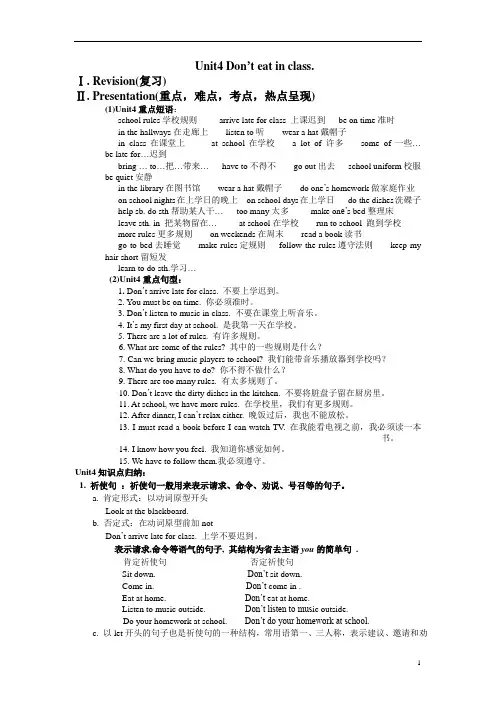
Unit4 Don’t eat in class.Ⅰ. Revision(复习)Ⅱ. Presentation(重点,难点,考点,热点呈现)(1)Unit4重点短语:school rules学校规则arrive late for class 上课迟到be on time准时in the hallways在走廊上listen to听wear a hat戴帽子in class在课堂上at school在学校 a lot of 许多some of一些…be late for…迟到bring … to…把…带来…have to不得不go out出去school uniform校服be quiet安静in the library在图书馆wear a hat戴帽子do one’s homework做家庭作业on school nights在上学日的晚上on school days在上学日do the dishes洗碟子help sb. do sth帮助某人干…too many太多make on e’s bed整理床leave sth. in 把某物留在…at school在学校run to school 跑到学校more rules更多规则on weekends在周末read a book读书go to bed去睡觉make rules定规则follow the rules遵守法则keep my hair short留短发learn to do sth.学习…(2)Unit4重点句型:1. Don’t arrive late for class. 不要上学迟到。
2. You must be on time. 你必须准时。
3. Don’t listen to music in class. 不要在课堂上听音乐。
4. It’s my first day at school. 是我第一天在学校。
5. There are a lot of rules. 有许多规则。
人教版七年级下册英语各单元知识点概括Unit 1 Can you play the guitar?◆短语概括1. play chess 下国际象棋2. play the guitar 弹吉他3. speak English 说英语4. English club 英语俱乐部5. talk to 跟说6. play the violin 拉小提琴7. play the piano 弹钢琴8. play the drums 击鼓9. make friends 结交朋友10. do kung fu 练 (中国 ) 功夫11. tell stories 讲故事12. play games 做游戏13. on the weekend/on weekends 在周末◆用法集萃1. play + 棋类 /球类下棋,打球2. play the + 西洋乐器弹/拉乐器3. be good at doing sth.= do well in doing sth. 善于做某事4.be good with sb. 和某人相处地好5.need sb. to do sth. 需要某人做某事6.can + 动词原形能/会做某事7.a little + 不行数名词一点儿8.join the club加入俱乐部9. like to do sth. =love to do sth.喜爱/喜爱做某事Unit 2 What time do you go to school?◆短语概括1. what time 几点2. go to school 去上学3. get up 起床4. take a shower 洗淋浴5. brush teeth 刷牙6. get to 到达7. do homework 做家庭作业8. go to work 去上班9. go home 回家10. eat breakfast 吃早餐11. get dressed 穿上衣服12. get home 到家13. eitheror 要么要么14. go to bed 上床睡觉15. in the morning/ afternoon/ evening 在上午 /下午 /夜晚16. take a walk 漫步17. lots of=a lot of 很多,大批18. radio station 广播电台19. at night 在夜晚20. be late for=arrive late for 迟到◆用法集萃1. at + 详细时间点在几点(几分)2. eat breakfast/ lunch/dinner 吃早餐 /午餐 /晚餐3. thirty\half past + 基数词点半4. fifteen\a quarter to + 基数词差一刻到点5. take a/an +名词从事活动6. fromto 从到7. need to do sth 需要做某事Unit 3 How do you get to school?◆短语概括1. get to school 抵达学校2. take the subway 乘地铁3. ride a bike 骑自行车4. how far 多远5. from home to school 从家到学校6. every day 每日7. take the bus 乘公共汽车8. by bike 骑自行车9. bus stop 公共汽车站10. think of 以为11. betweenand 在和之间12. one 11-year-old boy 一个 11 岁的男孩13. play with和玩14. come true 实现15. have to 不得不◆用法集萃1. taketo= go to by 乘去2. How do / does ( sb) get to ? 是如何到的?3. How far is it from to ? 从到有多远?4. It takes sb. some time to do sth. 做某事花销某人多长时间。
七年级下册人教版英语unit4知识点Unit 4的主题是“Where’s my backpack?”,指导学生学习描述物品的位置、帮助别人寻找物品的表达方式和重复多次询问的方法,同时强化了介词的使用。
本文将详细介绍七年级下册人教版英语unit4的知识点。
一、单词1. backpack - 背包2. pencil case - 铅笔盒3. ruler - 尺子4. eraser - 橡皮擦5. calculator - 计算器6. textbook - 教科书7. notebook - 笔记本8. pen - 笔9. pencil - 铅笔10. dictionary - 词典11. rubber band - 橡皮筋12. locker - (储物)柜子13. map - 地图14. globe - 地球仪二、常用短语1. Where's my/your/his/her...? - 我的/你的/他的/她的...在哪?2. It's in/on... - 它在...里面/上面。
3. Thank you for helping me. - 谢谢你帮我。
4. Don't worry. - 别担心。
5. Let's go and ask the teacher. - 我们去问老师吧。
6. Here you are. - 给你。
三、语法1. 疑问句构成:疑问词 + be动词/情态动词/助动词/实义动词 + 主语?例如: Where is my backpack?2. 介词介词用来表示物品的位置,位置可以是在某个物体上、在某个物体内、在某个物体旁等等。
例如: The pencil case is on the desk. (笔盒在桌子上。
)3. 重复多次询问当我们问别人一个问题,别人没有听清或者没有明白时,我们需要重复问一次或多次。
例如: Excuse me, where is my backpack? Where is it?四、写作学生需要在语言实践中掌握句型和表达方式,也需要学会具有情感、交际和实用功能的语言。
人教版七年级英语下册四单元知识点汇总Unit 4 Don’t eat in class.词汇精讲1. arrive1)arrive意为“到达”。
arrive at+小地点,arrive in +大地点。
例如:I will arrive in Beijing next week.我下周到北京。
I arrived at the small village on a cold morning.在一个寒冷的早晨我到达了那个小村庄。
2)arrive后面跟地点副词here, there, home时,不需要跟介词。
例如:arrive home到家arrive here到这儿注意:arrive late for与be late for是同义短语,都表示“做某事迟到”的意思。
arrive late for强调动作晚,be late for侧重状态晚。
例如:Don’t arrive late for the next test.=Don’t be late for the next test.下一次考试不要再迟到了。
2. listenlisten是不及物动词,意为“听,倾听”,强调听的动作,后面接宾语时要加上介词to。
例如:We should listen to the teacher carefully.我们应该认真听老师讲课。
Listen! Someone is singing in the garden.听!有人在花园里唱歌。
拓展:hear, listen和sound的辨析三个词都有“听”的意思,具体区别如下:hear意思是“听说,听到”,侧重听到的内容。
例如:I heard someone cry in the next room last night.昨晚我听见有人在隔壁哭。
listen意思是“听”,侧重听的动作。
例如:Listen! Someone is crying.听!有人在哭。
sound作动词讲时是连系动词,意为“听起来”,后面跟形容词作表语,构成主系表结构。
七年级下册英语单词表:Unit4附音标人教版七年级下册英语单词表:Unit4附音标英语是按照分布面积而言最流行的语言,但母语者数量是世界第三,仅次于汉语、西班牙语。
它是学习最广泛的第二语言,是近60个主权国家的官方语言或官方语言之一。
下面是店铺为大家收集的七年级下册英语单词表:Unit 4附音标,欢迎阅读,希望大家能够喜欢。
七年级下册英语单词表:Unit4附音标rule规则;规章n./ru:l/arrive到达v./Eraiv/on time准时hallway走廊;过道n.hall大厅;礼堂n./hR:l/dining餐厅/dainiN/listen听;倾听v./lisn/listen to听……fight打架;战斗v.&n./fait/sorry抱歉的;难过的;惋惜的adj./sRri/outside在外面;外面的adv.&adj./autsaid/wear穿;戴v./wZE/important重要的adj./impR:tEnt/bring带来;取来v./briN/have to 必须;不得不uniform校服;制服n./ju:nifR:m/quiet安静的adj./kwaiEt/out外出adv./aut/go out外出(娱乐)practice练习v.&n./prAktis/dish碟;盘n./diF/do the dishes清洗餐具before在……以前;以前prep.&adv./bifR:/make ones、bed铺床dirty脏的adj./dE:ti/kitchen厨房n./kitFin/more更多(的)adj.&pron./mR:/noisy吵闹的adj./nRizi/relax放松;休息v./rilAks/read读;阅读v./ri:d/terrible非常讨厌的;可怕的adj./terEbl/feel感受;觉得v./fi:l/strict严格的;严厉的adj./strikt/be strict(对某人)要求严格remember记住;记起v./rimembE/follow遵循;跟随v./fRlEu/follow the rules遵守规则luck幸运;运气n./lQk/keep保持;保留v./ki:p/hair毛发n./hZE/learn学习;学会v.七年级英语知识点总结1.基数词的用法。
人教版七年级下册英语各单元知识点归纳人教版七年级下册英语各单元知识点归纳Unit 1 Can you play the guitar?◆短语归纳1. play chess 下国际象棋2. play the guitar 弹吉他3. speak English 说英语4. join the swimming club 参加游泳俱乐部5. talk to 主动跟…说话6. talk with与…说话7. play the piano 弹钢琴8. play the drums 敲鼓9. make friends with与朋友10. do kung fu 练(中国) 功夫11. tell stories=tell a story 讲故事12. play games 做游戏13. on the weekend/on weekends 在周末14 want to do 想要去做15 music(音乐)-musician(音乐家)◆用法集萃1. play +棋类/球类下……棋,打……球[不戴帽子]2. play the +乐器弹/拉……乐器[戴帽子]3. be good at doing sth.= do well in doing sth. 擅长做某事4. need sb. to do sth. 需要某人做某事5. be good with sb. 和某人相处地好be good for 有利于6. can + 动词原形能/会做某事[can是照妖镜]7. a little + 不可数名词一点儿……8. join the …club 加入…俱乐部;9. like to do sth. =love to do sth.=like doing=enjoy doing 喜欢/喜爱做某事come to my school◆典句必背1. Can you draw? Yes, I can. / No, I can’t.2. What club do you want to join? I want to join the chess club.3. You can join the English club.4. Sounds good./That sounds good.5 What can you do?6. I can speak English and I can also play soccer.7. Please call Mrs. Miller at 555-3721. 8.tell sb (not)to do 告诉某人(不)要去做某事。
Unit 4 Don’t eat in class
◆短语归纳
1. on time 准时,按时2. listen to … 听……
3. in class 在课上4. be late for 做……迟到
5. have to 不得不6. be quiet 安静
7. go out 外出8. do the dishes 清洗餐具
9. make breakfast 做早饭10. make (one’s) bed 铺床
11. be noisy 吵闹12. keep one’s hair short 留短发
13. play with sb. 和某人一起玩14. play the piano 弹钢琴
15. have fun 玩得高兴16. make rules 制订规则
◆用法集萃
◆典句必背
1. Don’t arrive late for class. 上课不要迟到。
2. Can we bring music players to school? 我们可以带音乐播放器到学校吗?
3. And we always have to wear the school uniform. 并且我们总是不得不穿校服。
4. There are too many rules! 有太多的规则!
5. Don’t leave the dirty dishes in the kitchen! 不要把脏盘子留在厨房里!
6. I have to keep my hair short. 我不得不留短发。
◆话题写作
Dear Tom,
Thanks for your last letter. You want to know the rules in our school. Now let me
tell you about them.
We can’t arrive late for class. We can’t talk loudly in class. We should keep quiet.
When we meet our teachers on our way, we should say hello to them. We can
drink in class, and we can’t listen to music or play games in class.
I think we have too many rules. What about yours? Please write and tell me.
Yours,
Li Ming
补充:
1.肯定的祈使句:(1) 实义动词原形+其他;(2) be动词原形+形容词+其他;(3) Let sb
do sth.
否定的祈使句:(1) Don’t+实义动词+原形;(2) Don’t be+形容词+其他;(3) Don’t let sb do
1. Don’t + 动词原形+其他不要做某事。2. help sb. (to) do sth. 帮助某人做某事
3. too many + 可数名词复数太多的…… 4. practice doing sth. 练习做某事
5. be strict with sb. 对某人要求严格6. be strict in sth. 对某事要要求严格
7. leave sth sp. 把某物忘在某地8. keep + 宾语+形容词使……保持某种状态
9. learn to do sth. 学会做某事10. have to do sth. 不得不做某事
sth (4) No+Ving.
练:(1) My mother said to me, “Tom, _______ in bed.”
A. not read B. doesn’t read C. don’t read D. didn’t read
(2) Don’t __________ (fight). = No __________ (fight).
2. 不要迟到:Don’t arrive late. = Don’t be late. (arrive = be)
上课/上学不要迟到:Don’t arrive (be) late for class/school.
3. 主语省略(无主语):Don’t arrive late for class.
主语不省略(有主语):We can’t arrive ;ate for class.
4. 穿校服:单数:wear a uniform 复数:wear uniforms
5. 我从来没有任何快乐:I never have any fun.
(never译为“从来没有”,表示否定,否定句中表示“任何,一些”,用any)
6. 不要大声说话:Don’t talk loudly. 请大声说:Speak loudly, please.
7. 表示“地点”的词组:
(1) 在教室里:in the classroom 在课堂上:in class
(2) 在走廊上:in the hallways 在学校里:at school = in school
8. 表示“时间”的词组:
(1) 下课后:after class 放学后:after school
(2) 在上学的白天/晚上:on school days/nights 比较:at night
(3) 到晚上10点钟之前:by 10 o’clock p.m.
9. (1) with 和;如:He lives in Beijing with my parents. (不能用and)
(2) with 戴着;如:Do you know the fat man with a hat? (不能用wears)
(3) with 有着;如:It’s an old house with a beautiful garden. (不能用has)